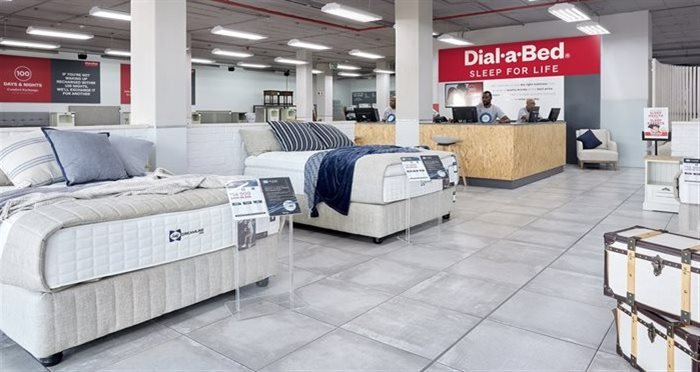
Source: File photo
The local Tapestry group includes popular made-to-order furniture retailer Coricraft, branded bedding retailer Dial-a-Bed, value bedding retailer The Bed Store and home textile retailer Volpes.
Growing production capacity
With the acquisition concluded, TFG is already exploring opportunities to further expand Tapestry’s manufacturing capabilities in furniture, bedding and home textiles to supply TFG’s homeware brands, particularly @Home, with a view to substituting products that are currently imported with locally-made goods.
“In all three of the Tapestry factories, we plan to further support their own manufacturing demand as well as increasing production to cater for the ongoing growth of TFG’s existing homeware businesses. With some modest capital expenditure investments into these manufacturing facilities, we will significantly expand their capacity to cater for this increased demand,” said TFG CEO Anthony Thunström.
“As with the local manufacture of apparel, we expect to realise similar commercial benefits from local production of homeware such as sofas, linen and beds, including improved cash flow and reduced inventory holding requirements, while avoiding global supply chain disruptions and elevated freight costs. We will build on Tapestry’s established vertically integrated, direct-to-consumer business model as we unlock synergies with the TFG businesses,” Thunström said.
Dozens of new furniture, homeware stores planned
TFG has also committed in its agreement with the Competition Commission to open a minimum of 35 new stores within three years under the four Tapestry brands - Coricraft, Dial-a-Bed, The Bed Store and Volpes.
“We expect to comfortably overshoot this target as we bring TFG’s scale and resources to bear on growing the Tapestry businesses, and we have already identified the need for an additional 17 stores for Volpes alone,” said Shani Naidoo, TFG group director for the Homeware Division.
“As an example of the kind of impact TFG has on businesses it has acquired, we have grown employment at Cotton Traders, the manufacturing arm of the Granny Goose business, by 20% within less than a year since we bought that company and half of its production is now going into TFG stores. The factory is running at full capacity and we are planning a R20m investment in expanding the factory,” Naidoo said.
Supporting reindustrialisation
Thunström commented: “By expanding the same vertical integration model which has been so successful in our apparel business to our Home Division, TFG is well set following the Tapestry acquisition to reindustrialise the homeware manufacturing sector in South Africa and grow local skills and employment. TFG already sources 73% of apparel locally and our intention is to bring more furniture production into South Africa as well.
“Current plans for expanding our local clothing manufacturing capability and building out our store footprint entail the creation of at least 10,000 new employment opportunities up to 2026, before considering our growth plans for the Tapestry brands,” said Thunström.
TFG expects to double its own local, quick-response clothing production from 15 million units in FY22 to 31 million units by FY26. This is on top of the locally manufactured apparel that the group already sources.
“At the same time we are supporting reindustrialisation, skills development and employment creation through our participation in the government’s Master Plan for Retail Clothing, Textile, Footwear and Leather.
Boosting job creation, employee wages
Thunström added that TFG will also lift wages for more than 10,000 of its customer-facing employees to 7% above the sectoral determined minimum. “This is a significant step in our investment behind fair and responsible pay and one that the group will continue to improve over time. It also forms part of a broader package of initiatives aimed at improving employee pay and benefits.”
TFG’s merchandise and supply chain MD, Graham Choice said that on the apparel front, TFG has committed to developing a number of manufacturing business units (MBUs) in the current year, consisting of adding jobs within its own factories as well as within strategic suppliers who largely produce exclusively for TFG.
“For each one million units of quick response apparel, we need two more MBUs, each with approximately 200 employees, producing an average of 4,200 units a day for 247 days a year. Ultimately, we need the equivalent of 30 MBUs to achieve the FY26 local manufacture target of 31 million units.
“This will generate more than 1,820 new employment opportunities in our own factories and another 4,190 in those of our strategic suppliers, for a total of more than 6 000 new employment opportunities in clothing manufacture alone,” said Choice.
He added that TFG’s commitment to supporting the government’s Retail Clothing, Textile, Footwear and Leather Master Plan had allowed the group to lobby for the lifting of the 22% duty on woven fabrics. “We hope knits and yarn will follow and enable more onshoring of this production and increased global competitiveness,” said Choice.
Expanding physical retail footprint
TFG’s growth plans in manufacturing are mirrored by an equally aggressive expansion in its store footprint.
Work is already underway to build out 342 stores, representing more than 92,000m2 of new retail space. With R600m in capex already committed to this work, TFG may spend as much as R1bn depending on continuing site identification, with an expected bump in revenue of about R3.8bn.
With an average of six employees per outlet, the store expansion initiative can be expected to generate more than 2,100 new employment opportunities.
As well as introducing a new minimum wage for customer-facing employees that is 7% above the legislated requirement, TFG has improved staff discounts for the majority of staff from 20% to 33%, addressing the value and accessibility of this benefit for all employees, and provided greater flexibility in retirement fund contributions to improve take-home pay when most needed.




























![Today, Halo and Demographica announce a new specialist agency, Second Rodeo]], headed up by Mike Stopforth (left). Dean Oelschig, managing partner and founder of Halo (right) says they will work as a group but ultimately, each agency will be an individual specialist](https://biz-file.com/c/2505/772543-64x64.jpg?2)





